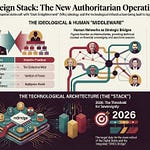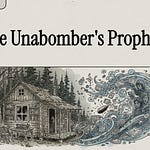Part 1: There’s a dangerous magic trick happening in American politics, and Donald Trump is its master illusionist.
Like an arsonist who sets a building ablaze only to show up in fireman’s gear, Trump has convinced millions that he alone can save the nation from a fire he helped ignite.
Lighting the Fire: The Systemic Erosion
From the very beginning of his political rise, Trump has trafficked in distrust. He labeled the media "the enemy of the people," questioned the legitimacy of the courts, delegitimized entire elections before and after votes were cast, and claimed the intelligence community was out to get him. His playbook is not about reforming flawed institutions. It’s about incinerating public trust in them altogether.
Congress? "Corrupt." The DOJ? "Weaponized." The electoral process? "Rigged." The press? "Fake."
None of these critiques were nuanced. None were tethered to a desire for institutional improvement. They were sledgehammer blows meant to destabilize the public’s confidence and render the system unrecognizable.
The Illusion of the Cure
And here’s the sleight of hand: after sowing that distrust, Trump offers himself not as a steward of democracy, but as its replacement. He doesn’t say, "Let’s fix the system." He says, "Only I can fix it."
This is where the longing for a king comes in. Disillusioned citizens, exhausted by polarization and chaos, are tempted by the illusion of strongman clarity. Trump is no longer merely a candidate. He is cast as a sovereign figure, above law, above process, above accountability.
He is not promising to restore democracy. He’s offering to override it.
From President to Messiah
In this mythology, Trump is not just a man. He becomes a vessel for grievance, a symbol of vengeance, a messiah for those who believe the republic has already fallen. That’s how he escapes accountability: by making people believe that the same system that would hold him accountable is the very enemy.
This is not leadership. It’s a hostile takeover of the American psyche.
A Warning to Patriots
Let’s be clear: healthy skepticism of government is American. But what Trump offers isn’t skepticism. It’s nihilism wrapped in patriotism. He doesn’t seek to reform institutions, he seeks to burn them down and crown himself ruler of the ashes.
To those who cherish the republic, who understand the cost of kings and the fragility of self-governance, this is the moment of reckoning.
Trump is not the cure. He is the crisis dressed as the solution. And if we don’t name that clearly and soon, we risk losing not just an election, but the entire democratic experiment.
The fire is still burning. The question is: will we keep mistaking the arsonist for the savior?
Part 2: The Mirror King, How Trump Became the Avatar of American Grievance
He’s not merely running for president. He’s running as a symbol, a mirror held up to a nation brimming with discontent. Donald Trump’s true power lies not in policies or platforms, but in emotional resonance. He doesn’t offer solutions; he offers validation. And for many Americans, that’s more than enough.
The Cult of Projection
Trump has cultivated a political identity that absorbs the anger, frustration, and fear of millions. He doesn’t just speak their language, he is their language. Every insult he hurls, every institution he discredits, every press conference turned spectacle is a performance of shared grievance. The “forgotten man” sees himself in Trump, not because of shared circumstances, but shared enemies.
It’s political projection on a mass scale. He becomes the vessel, the avatar, the projection screen for a public that feels humiliated and voiceless.
The Performance of Strength
In a culture that equates cruelty with confidence and mockery with masculinity, Trump performs strength through domination. He doesn’t debate, he belittles. He doesn’t explain, he proclaims. And in a fractured media landscape where spectacle trumps substance, this looks like leadership.
People confuse aggression with authenticity. But performance isn’t power, it’s illusion.
Branding Grievance as Identity
Trumpism is no longer a political stance. It’s a lifestyle brand. A worldview. A cultural tribe. It offers its followers an identity anchored in opposition, against elites, against experts, against change itself.
The more chaos he creates, the more he convinces his base that he alone can navigate it. It’s emotional extortion: Look what happens when I’m not in charge.
The Cost of the Mirror
But here’s the danger: when a people fall in love with their own reflection, they stop looking for the real thing. Trump offers grievance, but not governance. He offers emotional release, but not democratic renewal.
A nation cannot survive by chasing catharsis. It must seek solutions.
To love the mirror king is to stay trapped in a hall of distortions.
In Part 3, we dissect how undermining institutions became not just a tactic, but a long-term strategy to make democracy itself look like the problem.
Part 3: Defund to Destroy, How Undermining Institutions Became Strategy
This isn’t just chaos, it’s choreography. Trump’s war on institutions is not a byproduct of political turbulence; it’s a calculated strategy to render democracy unworkable, then replace it with loyalty to himself.
Strategic Sabotage
From the EPA to the State Department, from intelligence agencies to public health institutions, the Trump doctrine has been simple: defund, discredit, and delegitimize.
He installs loyalists, guts budgets, mocks experts, and then points to dysfunction as evidence of the institutions’ unworthiness. It’s a vicious cycle, one that turns civil service into political theater.
This is how confidence collapses. Not through revolution, but through slow institutional starvation.
Rule by Erosion
Rather than conquer government, Trump erodes it. Instead of replacing institutions with better ones, he strips them of function so that people no longer trust their protections.
And what fills the vacuum? Not reform. Not policy. But personality.
In his world, the courts are corrupt unless they side with him. Law enforcement is noble unless it investigates him. Intelligence agencies are fake unless they serve him.
This is not just anti-government rhetoric. It’s anti-institutional rule by narrative.
Why It Works
People don’t always notice a collapsed system. But they do notice who claims to rise above it.
By blaming institutions for all failures and chaos, Trump creates an illusion of competence through contrast. He’s the only one standing amid the ruins, a ruins he helped build.
The public, tired of dysfunction, turns to the figure who seems unbothered by it, never realizing he’s the one who rigged the wreckage.
Erosion as Empire
In healthy democracies, leaders build trust in institutions so the system outlives the leader.
In Trumpism, the opposite is true: the system must weaken so that only the leader remains.
The more people stop believing in the system, the more they become dependent on the man who claims to stand outside of it.
In Part 4, we follow the media mechanics behind this strategy, how memes, networks, and algorithms turned disinformation into doctrine.
Part 4: Alt-Reality Machine, How Disinformation Became Doctrine
The fourth wall of democracy has been breached, not with force, but with fiction. Trump's rise is inseparable from the media architecture that enabled him: a disinformation ecosystem designed not to inform, but to indoctrinate.
Viral Propaganda for the Digital Age
In the 21st century, lies don’t need to be hidden, they just need to be louder than the truth. Trump’s movement has mastered meme warfare, weaponized conspiracy, and turned every news cycle into a narrative battlefield.
A video clip out of context. A meme that mocks without facts. A hashtag that echoes across a million screens. These aren’t just communication tactics, they’re ideological infrastructure.
Networks of Noise
Fox News. Truth Social. Telegram groups. YouTube influencers. Podcasts masquerading as news.
Each node in this alt-media universe reinforces the message: You are the real American. The system hates you. Trump is your shield. Everyone else is lying.
This is more than bias, it’s a closed-loop belief system designed to inoculate followers against contradiction. Facts don’t matter. Trust is tribal.
Algorithms as Allies
Social media doesn’t reward truth. It rewards engagement. Rage, fear, and indignation spread faster than nuance or verification.
Trump’s content is built for this. Every tweet, every outburst, every "enemy of the people" claim is algorithmic rocket fuel.
In the digital coliseum, he’s not a politician. He’s a content creator with a nation-sized audience.
The Cost of the Alt-Reality
This isn’t just confusion, it’s control. A citizen who can’t tell what’s real can’t resist what’s false.
When your media diet is shaped by manipulation, your choices stop being your own. You vote not based on information, but on identity performance.
And democracy, deprived of an informed public, becomes a stage for authoritarianism to thrive.
In Part 5, we’ll explore how this identity shift reshapes the citizen, from participant to subject, and from voter to follower.
Part 5: The Subject and the Follower, How Democracy Becomes Courtroom Theater
By HASE Fiero
At the heart of every republic is a simple premise: that citizens are not subjects, and presidents are not kings. But in the age of Trump, that distinction is dissolving, replaced by a culture where loyalty is valued over participation, and devotion over deliberation.
From Citizenship to Submission
In a functioning democracy, citizens are empowered to question, dissent, and influence. Their power is rooted in pluralism and protected by transparency.
But Trumpism flips this on its head. To question Trump is to risk exile from the tribe. To dissent is to be labeled a traitor. The civic role narrows: from participant to spectator, from thinker to follower.
The citizen, once central to the republic, becomes a prop in a spectacle, a body in a crowd, a reaction on a feed, a vote in a rigged performance.
The Politics of Devotion
Every populist strongman needs not just voters, but worshipers. Trump isn’t asking for consent, he’s demanding allegiance. His rallies are not campaign events; they are loyalty tests. His social media feed is not messaging; it’s a sermon.
The line between political support and personal submission blurs. He becomes not a representative, but a redeemer. Not a candidate, but a cause.
The Ritual of the Courtroom
Even legal battles become part of the performance. Indictments aren’t scandals, they’re sacraments. Every prosecution is recast as persecution, reinforcing the narrative that Trump is suffering for his followers, not because of his actions.
The courtroom becomes a stage. The defendant becomes the martyr. And the public is cast not as jury, but as choir.
What We Lose
This identity shift doesn’t just warp politics, it warps the public itself.
The more people define their political selves by loyalty to one man, the less they are able to act as citizens of a collective republic. Dialogue disappears. Accountability vanishes. And with it, the very structure of shared governance.
This is how democracy decays, not always through force, but through transformation. By turning citizens into subjects, and governance into ritual.
In Part 6, we’ll confront the ultimate consequence: how this transformation prepares the ground for permanent power, an American Caesar wrapped in red, white, and blue.
Part 6: The American Caesar, When the Crown Fits
It doesn’t begin with a crown. It begins with a void, of trust, of stability, of shared truth. Into that vacuum walks the strongman, cloaked not in gold or sashes, but in grievances, slogans, and flags.
We are not watching the birth of a dictatorship in the traditional sense. We’re watching the soft coronation of a Caesar by a fractured public that no longer believes in the institutions that once protected it.
The Strongman’s Playbook
Trump has rewritten the terms of presidential power, not as a public servant, but as a personal sovereign. He uses executive power as a tool of personal vendetta, public policy as performative vengeance, and the legal system as a soapbox for martyrdom.
His genius lies not in governance, but in spectacle. In every crisis, he finds a stage. In every indictment, a spotlight. In every accusation, a campaign rally. The more opposition he faces, the more he recasts himself as a folk hero besieged by the “deep state.”
It is not justice he seeks, but perpetual conflict, because in chaos, the strongman thrives.
Institutional Collapse as Coronation
Here’s the dark irony: the more Trump weakens democratic checks, the stronger his grip becomes. Every norm shattered becomes a precedent for his return. Every rule broken becomes a badge of honor. Every violation of law rebranded as rebellion against tyranny.
This is not a fight for the presidency. It’s a slow-motion conversion of a republic into a cult of personality, masked as patriotism.
The Loyal Opposition No Longer Exists
A healthy democracy has tension. It has critics and counterbalances. But Trumpism annihilates nuance. To oppose him is to oppose America. To question him is to be “un-American.”
This rhetorical cleansing has cleared the path for the unimaginable: a nation willing to cede constitutional order for the comfort of a familiar face.
This is not fascism with jackboots. It’s Caesarism in a baseball cap.
The Final Stage of the Illusion
The people who once cried “drain the swamp” are now building a throne. They don’t want transparency; they want triumph. They don’t want a president; they want a redeemer.
But history warns us: republics don’t fall by conquest alone, they fall by consent. By applause. By the willful surrender of responsibility in exchange for identity, vengeance, and belonging.
This is how the American Caesar rises, not against the people’s will, but because of it.
In the final installment of this series, Part 7, we explore how to reverse course, what democratic renewal might look like in an era that feels post-democratic.
Part 7: Republic Reimagined, The Path to Democratic Renewal
If this series has traced the descent, from civic erosion to Caesarism, then this final chapter must look up. Because despair is not strategy, and critique without construction is surrender.
The Fire Next Time
The threat to democracy is not just Trump, it’s the public conditions that allowed him to rise. If we only remove the man, but not the machinery of manipulation, the crown will find another head.
To save the republic, we must rebuild its civic infrastructure, not just its laws, but its logic, its lifeblood, and its legitimacy.
Reclaiming the Citizen
Democracy cannot survive on autopilot. We must reawaken civic identity:
Civic Education must teach power literacy, not just dates and documents, but how money, media, and influence truly shape government.
Participation must move beyond voting to everyday engagement, budget hearings, community organizing, watchdog journalism, and local coalitions.
Digital Literacy must be embedded in our culture, so we can recognize manipulation, resist echo chambers, and demand accountability from platforms.
Reforming Institutions, Not Revering Them
We must stop treating institutions as sacred and start making them functional:
Term limits, judicial accountability, and election reform must become nonpartisan imperatives.
Anti-corruption mechanisms must be real, resourced, and respected.
Transparency laws must evolve for a digital era where secrecy hides in plain sight.
From Spectacle to Substance
The media must reclaim its purpose:
Less punditry, more policy.
Less breaking news, more broken systems.
Less “both sides,” more truth-seeking.
And we must support outlets, local, independent, investigative, that serve democracy, not dopamine.
The Moral Center Must Hold
We cannot outsource the soul of the nation. It is built in our homes, our art, our schools, our pulpits, and our protests.
The republic will not be saved by algorithms or algorithms alone. It will be saved when the people remember that citizenship is not just a right, but a ritual, a daily act of stewardship.
Final Warning, Final Hope
To restore a republic is harder than to build one. It demands courage without applause, commitment without certainty, and a faith that democracy is not the destination, but the discipline.
The age of kings must end again. Not just at the ballot box, but in the hearts of a people who remember they are sovereign.
Let the throne remain empty. Let the republic rise.










